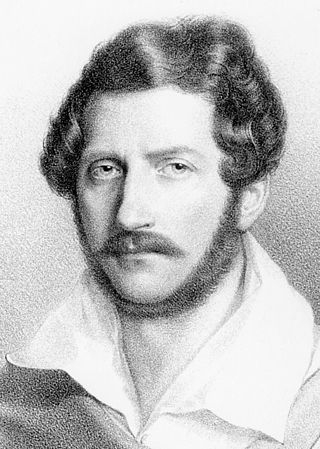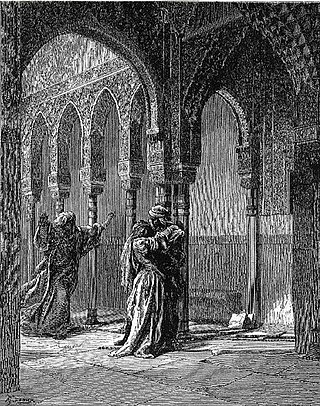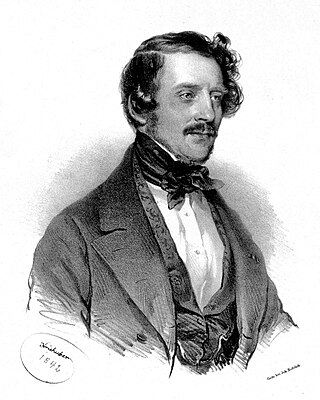
Le convenienze ed inconvenienze teatrali, also known as Viva la mamma and Viva la Diva, is a dramma giocoso, or opera, in two acts by Gaetano Donizetti. The Italian libretto was written by Domenico Gilardoni, adapted from Antonio Simeone Sografi's plays Le convenienze teatrali (1794) and Le inconvenienze teatrali (1800).

Il campanello or Il campanello di notte is a dramma giocoso, or opera, in one act by Gaetano Donizetti. The composer wrote the Italian libretto after Mathieu-Barthélemy Troin Brunswick and Victor Lhérie's French vaudeville La sonnette de nuit. The premiere took place on 1 June 1836 at the Teatro Nuovo in Naples and was "revived every year over the next decade".

Alahor in Granata is an opera in two acts by Gaetano Donizetti to an anonymous Italian libretto after Jean-Pierre Claris de Florian's text Gonzalve de Cordoue, ou Granade reconquise (1793). However, it seems that the original basis of the libretto goes back to one by Felice Romani written for Meyerbeer in 1821, which in turn can be traced back through another iteration to begin with the de Florian version.

Caterina Cornaro ossia La Regina di Cipro is a tragedia lirica, or opera, in a prologue and two acts by Gaetano Donizetti. Giacomo Sacchero wrote the Italian libretto after Jules-Henri Vernoy de Saint-Georges' libretto for Halévy's La reine de Chypre (1841). It is based on the life of Caterina Cornaro, Queen of Cyprus from 1474 to 1489. It premiered at the Teatro San Carlo, Naples on 12 January 1844.

Olivo e Pasquale is a melodramma giocoso, a romantic comedy opera, in two acts by Gaetano Donizetti. Jacopo Ferretti wrote the Italian libretto after Antonio Simeone Sografi's play.

Emilia di Liverpool is a dramma semiserio, ("half-serious") dramatic opera, in two acts with music by Gaetano Donizetti. Giuseppe Checcherini wrote the Italian libretto after the anonymous libretto for Vittorio Trento's Emilia di Laverpaut, itself based on Stefano Scatizzi's play of the same name. It premiered on 28 July 1824 at the Teatro Nuovo in Naples.

Il diluvio universale is an azione tragico-sacra, or opera, by Gaetano Donizetti. The Italian libretto was written by Domenico Gilardoni after Lord Byron's Heaven and Earth and Francesco Ringhieri's tragedy Il diluvio (1788).

Zoraida di Granata is a melodramma eroico, in two acts by Gaetano Donizetti. The Italian libretto had been partly prepared by Bartolomeo Merelli, based on the French play, Gonzalve de Cordoue ou Grenade Reconquise by Jean-Pierre Claris de Florian (1791), and on a libretto by Luigi Romanelli to an opera by Nicolini called Abenamet e Zoraide.

Maria Padilla is a melodramma, or opera, in three acts by Gaetano Donizetti. Gaetano Rossi and the composer wrote the Italian libretto after François Ancelot's play. It premiered on 26 December 1841 at La Scala, Milan. The plot is loosely based on the historical figure María de Padilla, the mistress of Pedro the Cruel, King of Castile.

Torquato Tasso is a melodramma semiserio, or "semi-serious" opera, in three acts by Gaetano Donizetti and based on the life of the great poet Torquato Tasso. The Italian libretto was written by Jacopo Ferretti, who used a number of sources for his text, including works by Giovanni Rosini, Goethe, Goldoni and Lord Byron, as well as Tasso's actual poetry. It premiered on 9 September 1833 at the Teatro Valle, Rome.

Gabriella di Vergy is an opera seria in two acts by Gaetano Donizetti written in 1826 and revised in 1838, from a libretto by Andrea Leone Tottola, which was based on the tragedy Gabrielle de Vergy (1777) by Dormont De Belloy. Prior to that, the play was itself inspired by two French medieval legends, Le châtelain de Coucy et la dame de Fayel and Le Roman de la chastelaine de Vergy.

Imelda de' Lambertazzi is a melodramma tragico or tragic opera in two acts by Gaetano Donizetti from a libretto by Andrea Leone Tottola, based on the tragedy Imelda by Gabriele Sperduti. It received its first performance on 5 September 1830 at the Teatro San Carlo, Naples.

Gianni di Parigi is an 1839 melodramma comico in two acts with music by Gaetano Donizetti to a libretto by Felice Romani, which had previously been set by Francesco Morlacchi in 1818 and by Giovanni Antonio Speranza in 1836.

La zingara is an opera semiseria in two acts by Gaetano Donizetti, set to a libretto by Andrea Leone Tottola after La petite bohémienne by Louis-Charles Caigniez, which was itself derived from a work of August von Kotzebue.

Elvida is a melodramma or opera in one act by Gaetano Donizetti. Giovanni Schmidt wrote the Italian libretto. The opera was written as a pièce d'occasion for the birthday of Queen Maria of the Two Sicilies. The choice of subject matter was no doubt intended as an elegant acknowledgement of the Queen's Spanish ancestry. Donizetti received little financial reward for the work and, as a result, put the minimum of effort into its composition.

Alfredo il grande is a melodramma serio or serious opera in two acts by Gaetano Donizetti. Andrea Leone Tottola wrote the Italian libretto, which may have been derived from Johann Simon Mayr's 1818 opera of the same name. The opera tells the story of the Anglo-Saxon king Alfred the Great.

Sancia di Castiglia is an Italian opera seria in two acts by Gaetano Donizetti to a libretto by Pietro Salatino. It was first performed at the Teatro San Carlo in Naples on 4 November 1832, conducted by Nicola Festa.

Il giovedì grasso is a farsa in one act by Gaetano Donizetti, from a libretto by Domenico Gilardoni. The literal translation of the title is "Fat Thursday", a reference to Carnival celebration. The libretto was adapted from the French comedies Monsieur de Pourceaugnac by Molière and Le nouveau Pourceaugnac by Charles-Gaspard Delestre-Poirson and Eugène Scribe. The opera uses spoken dialogue rather than recitatives, and the buffo role is given in the Neapolitan language. The work premiered at the Teatro del Fondo in Naples on 26 February 1829.

Una follia is a farsa in one act by composer Gaetano Donizetti. The work premiered on 15 December 1818 at the Teatro San Luca in Venice. The opera uses the same Italian-language libretto by Bartolomeo Merelli after August von Kotzebue's Der Graf von Burgund that Donizetti used for his Enrico di Borgogna a month earlier, but with different music. It was given one performance and "never performed again, and its score has never been found."

Il paria is an opera in two acts by Gaetano Donizetti from a libretto by Domenico Gilardoni, based on Le Paria by Casimir Delavigne and Michele Carafa's Il paria with a libretto by Gaetano Rossi.





